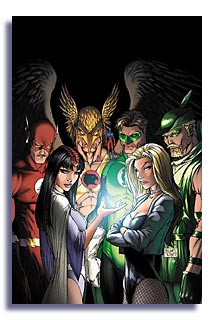This summer,
DC Comics has turned their back on that trick. Instead,
they let novelist (and upcoming television producer) Brad
Meltzer loose on a tightly focused mini-series with repercussions
that will pop up in books over the next few years. Editor
Mike Carlin calls those "follow-ups," not "crossovers."
All the story you need to know is in the seven issues of
Identity Crisis.
After only two
issues, it has indeed rocked readers with a series of twists
and turns that may very well achieve Meltzer's goal of "…bringing
a sense of danger back to the DC Universe." Already we've
had a controversial death and somehow worse, a rape.
(SPOILER
ALERT: Sue Dibny, non-powered but public wife of The
Elongated Man, is brutally murdered in the first issue,
carrying her husband's unborn child. It is revealed in the
second issue that years before, super-villain Dr. Light
found her alone in the Justice League Satellite and raped
her before the League came and basically lobotomized him
as punishment.END SPOILER)
At Comic-Con,
the creators and powers that be gathered to discuss the
controversy and answer questions about the project that
spawned the fandom-only slang term "to dibny," or basically
"get screwed over." (Congratulations, Augie, it seems to
have entered the lexicon.)
|
|
|
Turner,
Meltzer and Carlin brace themselves.
|
Carlin, Meltzer,
cover artist Michael Turner, penciler Rags Morales and inker
Michael Bair sat down at the long panel table to suffer
the slings and arrows of outraged fans. Since most of these
guys also sit on the Wizard Hot list, too, any barbs were
blunted. Mostly, fans are just stunned by this work, and
it shows.
The first question
out of the gate, was, of course, "WHY SUE DIBNY?" Pausing
for a moment, Meltzer acknowledged that she was "on the
list" of characters that he could kill, but stressed that
it wasn't for the shock value. After 9/11, he said seriously,
we never looked at fire fighters the same way again. We
realized that every day, they put on that equipment and
risk their lives. Heroism has consequences, and it was time
to remind comic book readers of that fact. Putting on the
spandex can't be for fun and games; there's danger to it.
Besides, he
said, you knew it wasn't going to be Lois Lane "…in the
first issue."
Though the writing
on the series has been stellar, both Meltzer and Carlin
stressed the contributions of an incredible art team. All
involved praised the combination of Morales and Bair, with
Meltzer likening them to jazz musicians, riffing off of
each other's work. Both artists took it with humility; Bair
quietly offered that Morales' pencils challenge him to raise
the bar on his own inking.
|
|
|
As
you can see, Meltzer is serious about his work.
|
As for Morales,
he has been working extremely hard to produce the best of
his career. Each character, Meltzer commented, has been
carefully cast by the penciler. Fans might agree with the
writer's assessment that a single shot of Ralph Dibny losing
control of his face was an incredibly moving panel - and
one that Meltzer thought was going to be too difficult a
challenge to draw. Though they did not elaborate on Morales'
"casting," the artist did slip that Captain Boomerang, a
villain way past his prime, is visually based on porn star
Ron Jeremy.
Despite the
sleaze and the danger, Meltzer wants Identity Crisis
to stand as a book that "…reclaims the Silver Age." A careful
reading of the first two issues proves it, with references
to a classic Elongated Man story (no, really! There were
such things) and the thing Meltzer's fanboyishness may be
most proud of: really pinpointing the moment when Dr. Light
went from homicidal genius (in Silver Age terms, anyway)
to ineffectual loon.
The writer also
defended the controversial rape issue. With all the death
and destruction DCU villains cause on a regular basis, to
Meltzer it is almost more offensive that comics haven't
dealt with the violation of women. Not for entertainment
value, but because both Meltzer and his wife have been active
in helping stop violence against women. (He may be wrong
about it never having been dealt with in the DCU; in Mike
Grell's The Longbow Hunters, Black Canary was beaten,
tortured and raped, but that was twenty years ago, a long
time to turn a blind eye to the crime's existence.)
|
|
|
Signing
books for fans who may or may not watch Jack
and Bobby on The WB.
|
More importantly,
Meltzer would not have us characterize Identity Crisis
as an adventure. Rather, it's a tragedy, and not just because
of the incredibly effective funeral scene in the first issue.
(Most of the credit for that should go to colorist Alex
Sinclair, according to the panel members present.)
What do we have
to look forward to in this fine tragedy? Everybody stayed
as mum as they could, despite being peppered with questions.
An audience member pointed out that a recent issue of Superman/Batman
had Lex Luthor mention a coming crisis; all of the panel
answered with a pregnant silence. And with Elongated Man
playing such a strong role in this story, could Plastic
Man be coming, too? Meltzer would not answer.
But then, we
don't go to panels for answers, though we think we do. Really,
comics fans love to be teased, almost as much as they love
to be truly moved by a book. Identity Crisis wins
on both counts.









